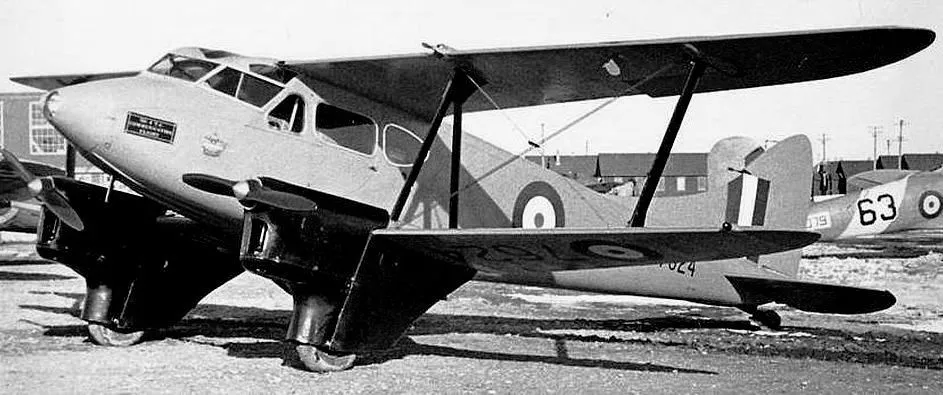Dragonfly (Total: 8, Canadian: 6, Group 0)
de Havilland Dragonfly

de Havilland DH.90 Dragonfly, RCAF (Serial No. 7624).
The de Havilland DH.90 Dragonfly is a 1930s British twin-engined luxury touring biplane built by the de Havilland Aircraft Company at Hatfield Aerodrome.
The Dragonfly shares a clear family resemblance with the Dragon Rapide, but is smaller and has higher aspect ratio, slightly sweptback wings. The lower wing has a shorter span than the upper, unlike the DH.89, and the top of the engine nacelles protrude much less above its surface because the fuel tank had been moved to the lower centre section. Structurally, too they are different: the Dragonfly had a new preformed plywood monocoque shell and strengthened fuselage. It was designed as a luxury touring aircraft for four passengers and a pilot, with provision for dual controls
In 1936 seven de Havilland DH.90 Dragonfly airframes were shipped to Canada, and erected by de Havilland Canada. Two were flown by the RCAF, and two were flown by the RCMP to combat rum runners. The remainder served a variety of small commercial operators. At least one, Reg. No. CF-BFF, was fitted with Edo floats, and was flown commercially as a Dragonfly floatplane. The RCAF eventually flew six, (Serial Nos. 7623-7628). Harold Skaarup web page and Wikipedia
Dragonfly serial 7623
s/n 7623
m/d D.H.90
c/n 7543
7623
Known Units:
Built in 1937, imported to Canada in summer of 1937. Ex civil register, CF-BFF. Acquired from de Havilland Canada. Had been operated on lease by Consolidated Mining and Smelting, and Canadian Airways. Category C damage at Toronto on 4 May 1942. Returned to civil register in December 1942, to Quebec Airways, but not struck off until 26 January 1943. Later purchased by de Havilland Canada in 1945, sold to L.A. Seguin of Rouyn Quebec on 16 February 1946, then to Gold Belt Air Services of Rouyn on 16 July 1948. Sunk through ice after landing on Ottawa River on 20 December 1949, not repaired.last update: 2025-November-19
1941-September-23 Accident: 1 COMM & Ferry FLIGHT Loc: Aerodrome Names: Deming | Wilson
1942-May-04 Accident: 1 COMM & Ferry FLIGHT Loc: Island Airport Names: Mostyn | Russell
1943-January-26 Struck off Strength 2019-08-20
Dragonfly serial 7624
s/n 7624
m/d D.H.90
c/n 7557
7624
Known Units:
Built in 19840, imported as de Havilland Canada demonstrator and registered as CF-BXV. Operated by No. 4 Training Command in western Canada. Back to civil register as CF-BXV, registered to Johannesson Flying Service of Winnipeg on 22 February 1945. Ground looped on landing at Winnipeg on 3 April 1945, port main gear collapsed, apparently not repaired.last update: 2025-November-19
1942-August-25 Accident: COM & Ferry FLIGHT Loc: Calgary Names: Hall | Shelton | Walsh
1945-January-08 Struck off Strength 2019-08-20
Dragonfly serial 7625
s/n 7625
m/d D.H.90
c/n 7558
7625
Known Units:
Previous civil registration (if any) unknown. 1940 production date, may have gone direct to RCAF. Operated by No. 4 Training Command in western Canada. Category B damage on 6 May 1942 at Claresholm, Alberta.last update: 2025-November-19
1942-May-06 Accident: 4 COMM & Ferry FLIGHT Loc: Main Aerodrome Claresholm Names: Cook | Frizzle | Ross
1943-March-08 Struck off Strength 2019-08-20
Dragonfly serial 7626
s/n 7626
m/d D.H.90
c/n 7530
7626
Known Units:
Imported in 1937. Operated prewar by RCMP as CF-MPA, first registered to them on 1 May 1937. Operated by No. 3 Training Command in eastern Canada.last update: 2025-November-19
1943-January-28 Struck off Strength Struck off, reduced to spares 2019-08-20
Dragonfly serial 7627
s/n 7627
m/d D.H.90
c/n 7531
7627
Known Units:
Originally imported to Canada as CF-BZA. Operated by RCMP as CF-MPB, first registered to them on 29 May 1937. Category C damage on 19 June 1942 at Oshawa, Ontario. Back to civil register as CF-BZA, registered to T.P. Fox of Verdun, Quebec on 1 June 1945. To Associated Airways if Edmonton, Alberta on 1 November 1945. Dismantled 8 October 1949.last update: 2025-November-19
1942-June-19 Accident: 1 COMM & Ferry FLIGHT Loc: 20 Service Flying Training School Names: Mullin | O'Farrel | Witt
1944-June-19 Struck off Strength 2019-08-20
Dragonfly serial 7628
s/n 7628
m/d D.H.90
c/n 7522
7628
Known Units:
Built in 1936. Registered as CF-BBD to de Havilland Canada on 24 October 1936. To Royal Canadian Mounted Police on 15 July 1937, as CF-MPC. To civil register as CF-BXU on 30 May 1945, registered to Johannesson Flying Service of Winnipeg. Damaged beyond repair in a forced landing at Thorhild, Alberta on 23 December 1945. Port engine had failed, attempted to land on very rough field.last update: 2025-November-19
1941-June-12 Struck off Strength 2019-08-20
